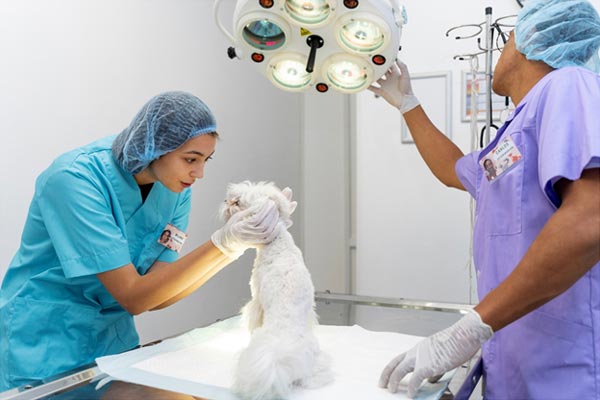If you have a canine pet, you must be aware that when they experience a debilitating knee injury, their quality of life is affected.
TPLO (Tibial Plateau Leveling Osteotomy) surgery, one of the common veterinary surgical procedures, has emerged as a popular and effective solution to address cranial cruciate ligament (CCL) rupture in canines.
However, it’s important to understand that not all canines are viable candidates for TPLO.
Here, we’ll review the important considerations and pros and cons of TPLO surgery dogs.
This guide will help you choose the best option for your furry friend’s pet care when it has a CCL injury.
So keep reading!
Table of Contents
Understanding TPLO Surgery
TPLO surgery is a complex procedure that aims to stabilize the knee joint and relieve pain caused by a torn CCL.
The procedure involves the cutting and repositioning of the tibial plateau to change the angle of the knee joint.
As a result, this adjustment effectively reduces the instability and discomfort in the dog’s joints.
Important Considerations: Viability
Before letting your canine fellow undergo the TPLO surgery dog, you must consider the following factors.
Dog Size and Age
TPLO surgery can be performed on dogs of various sizes and ages, but not all dogs are suitable candidates.
Smaller and lighter dogs may not experience the same levels of stress on their knees. This makes less invasive treatments or physical therapy more appropriate.
Additionally, younger dogs may benefit more from surgery. The reason is that they can recover more quickly and have greater chances of returning to their active lifestyle.
Overall Health
The overall health of the dog is a significant factor to consider that helps determine if TPLO surgery is a viable option.
A thorough pre-surgery evaluation by a veterinarian is essential to assess the dog’s general health.
Doing so ensures they can tolerate anesthesia and the recovery process.
Budget Considerations
It’s crucial to have a clear understanding of the financial commitment involved with the TPLO surgery dog.
This is a relatively costly procedure. So, pet owners must consider their budget before their dog undergoes the procedure.
Commitment to Post-Operative Care
TPLO surgery is just the beginning of the journey to recovery.
Dogs require extensive post-operative care and rehabilitation, including:
- Physical therapy
- Exercise restrictions
- Medication
Owners need to be committed to following these guidelines for a successful outcome.
Pros of TPLO Surgery Dog
Here are some considerable pros of this canine surgical procedure:
Fast Recovery
Many dogs recover relatively quickly from TPLO surgery. However, the exact timeline varies depending on the individual dog.
In most cases, dogs are back to their normal activities within a few months after the surgery.
Long-term Results
TPLO surgery often provides a permanent solution to CCL injuries.
Dogs can continue to enjoy an active and fulfilling life without recurrent issues.
Reduces Arthritis Risk
TPLO can reduce the risk of developing arthritis in the affected knee.
This is particularly important for older dogs who may already have arthritis in their joints.
Cons of TPLO Surgery
Some considerable cons of TPLO surgery dog are as follows:
Cost
As mentioned earlier, TPLO surgery is one of the most expensive common veterinary surgical procedures.
The cost includes:
- Procedure itself
- Post-operative care
- Potential complications
So, it’s essential to be prepared for the financial commitment.
Surgical Risks
TPLO, like other veterinary surgeries, comes with inherent risks, including:
- Infection
- Anesthesia complications
- Surgical errors
Therefore, owners should discuss these potential risks with their veterinarian.
Post-Operative Care
Extensive post-operative care can be demanding for the pet owner.
So, they need to follow the veterinarian’s instructions and invest time and effort into their pet’s recovery.
No Guarantees
While TPLO surgery is highly effective, there are no guarantees of a complete recovery.
Some dogs may experience complications or fail to regain their full mobility.
Additionally, some may require further surgeries.
Saying it All!
The above discussion states that the TPLO surgery dog is a valuable and effective solution for canines suffering from torn CCL injuries.
However, it’s essential to carefully consider the suitability of this surgery for your dog, taking into account the above-discussed factors.
Make informed decisions with their best interests at heart, and you’ll be well on your way to helping them live their best life.
For more guides on common veterinary surgical procedures and veterinary education, you need to visit Vet and Tech. This platform features comprehensive veterinary online learning resources.
FAQs
How Much Does TPLO Surgery Cost for Dogs in the USA?
The cost of TPLO surgery for dogs in the USA varies depending on several factors. However, as a general rule of thumb, this canine orthopedic procedure costs between $3,000 and $8,000 per knee.
Is TPLO Surgery Successful in Older Dogs?
Yes, but the recovery time for TPLO surgery may be longer for older dogs. Additionally, older dogs may be at an increased risk for complications.
What is the Best Alternative Option to TPLO Surgery?
The best alternative option to TPLO surgery depends on the individual dog and their specific case. However, the most common alternative options are Extracapsular repair (ECR) and Tibial tuberosity advancement (TTA).

